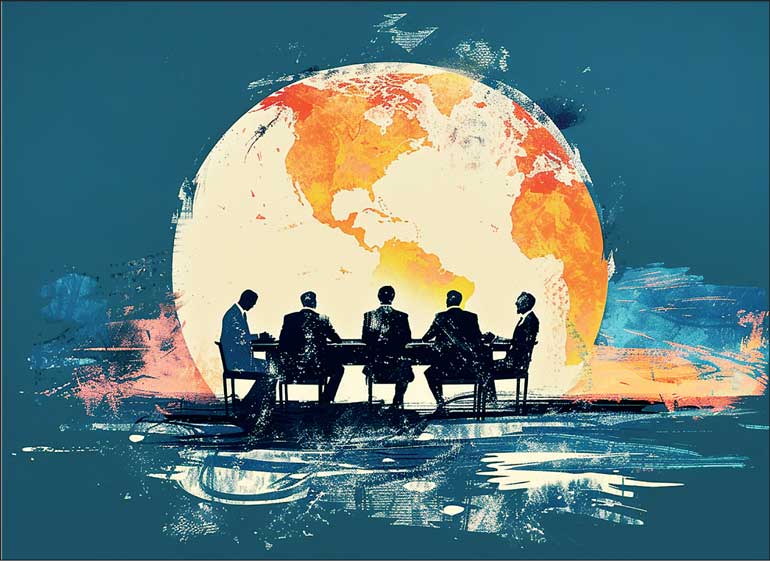Thursday Feb 19, 2026
Thursday Feb 19, 2026
Saturday, 3 August 2024 00:05 - - {{hitsCtrl.values.hits}}

COP29 stands at a critical juncture and could determine the way forward on issues such as climate finance
 On 11 November 2024, less than four months away, the 29th meeting of the Conference of the Parties (COP29) will begin in Baku, Azerbaijan. This event will bring together representatives of the almost 200 countries who are Parties to the United Nations Framework Convention on Climate Change (UNFCCC) and the Paris Agreement, as well as thousands of other stakeholders including civil society, academia, trade unions, the private sector, youth, and media.
On 11 November 2024, less than four months away, the 29th meeting of the Conference of the Parties (COP29) will begin in Baku, Azerbaijan. This event will bring together representatives of the almost 200 countries who are Parties to the United Nations Framework Convention on Climate Change (UNFCCC) and the Paris Agreement, as well as thousands of other stakeholders including civil society, academia, trade unions, the private sector, youth, and media.
As the impacts of climate change continue to escalate around the world, developing countries are facing severe challenges in mobilising resources and balancing the need for ambitious climate action with domestic needs and development priorities in the face of mounting debt, supply chain disruptions, and macroeconomic difficulties. With 2030 approaching quickly, COP29 stands at a critical juncture and could determine the way forward on a range of issues, most importantly the provision of climate finance and other means of implementation.
Financing ambitious climate action
At COP29, all eyes will be on climate finance as the central issue, as Parties are supposed to decide on a new goal on climate finance (the “new collective quantified goal,” or NCQG) to be mobilised by developed countries to support the efforts of developing countries on climate action. In 2015, developed countries had pledged a collective amount of $ 100 billion per year from 2020 onwards; now, expectations are high for developed countries to not only fulfil these existing commitments but to agree on a significantly scaled-up goal. So far, climate finance has fallen short of the actual needs of developing countries, and the new goal needs to close at least part of the existing funding gaps for climate change mitigation, adaptation, and addressing climate-induced loss and damage.
The adverse impacts of climate change are responsible for immense losses and damages at the global level and threaten to severely impact the economic stability of countries as well as the livelihoods and wellbeing of vulnerable communities. In addition to the global challenge of emission reduction and climate change mitigation, adapting to potential impacts and addressing loss and damage are therefore crucial for developing countries. However, to do so in ambitious ways and strengthen their national contributions, they need substantial support in terms of funding, technology transfer, and capacity-building. The new finance goal has the potential to transform the landscape of climate action and move from billions to trillions of dollars of collective finance.
Collective action towards a common goal
Nationally Determined Contributions (NDCs) are at the heart of the Paris Agreement, as they represent countries’ plans to reduce their respective emissions, invest in climate change adaptation, and, potentially, address loss and damage. With the adoption of the Paris Agreement, the intended NDCs of countries turned into the first round of NDCs, which was then updated five years later in 2020-2021. Now, the next cycle is coming up, and countries are expected to submit their third NDCs (“NDCs 3.0”) by mid-February 2015, nine months ahead of COP30 next year.
Going into COP29, countries will aim to develop more ambitious and robust NDCs, with greater ambition, clearer timelines, and concrete actions that accelerate overall ambition. Additionally, there will be a focus on ensuring that NDCs are transparent, measurable, and verifiable to allow for effective tracking of progress and fulfil their respective reporting requirements. However, to do so, they need the assurance that finance will be available and accessible, allowing them to implement commitments that go beyond what national budgets can afford.
Adaptation and climate-induced loss and damage
In addition to finance, both adaptation and loss and damage have major agenda items that won’t be resolved at COP29 but are likely to command considerable attention. For adaptation, the focus will be on the Global Goal on Adaptation (GGA), which was established with the Paris Agreement and operationalised through the UAE Framework for Global Climate Resilience at COP28 last year. Under this framework, there are eleven global targets for adaptation, which are now in need of becoming more concrete and tangible.
COP29 marks the mid-point of the new UAE-Belém work program, which aims to develop indicators for the GGA’s targets over a two-year period that ends at COP30. In Baku, participants of COP29 can reflect on the progress made so far and make course corrections to ensure that the work program achieves tangible results and allows for the GGA to become a North Star that guides adaptation efforts across the globe.
Similarly, a new fund for responding to loss and damage was established at COP28 and is now in the process of being operationalised, with a lot of open questions but also some progress in outlining its structure and procedures. With the host country now chosen as Philippines, discussions around loss and damage could move towards practical considerations of sourcing, allocation, and distribution of funds, as well as linkages between the work of the Fund and other relevant institutions, such as the Warsaw International Mechanism or the Santiago Network.
Conclusions
There are many agenda items and workstreams that will be discussed or negotiated at COP29, spanning all regions and almost all sectors across the globe. This includes formal negotiation items such as just transition, transparency, technology, capacity-building, climate empowerment, or gender, but also thematic priorities within and around the climate negotiation process, including food systems, water, health, natural ecosystems, or human mobility. With under four months till the opening plenary, countries and groups need to define their priorities and expectations for this important milestone in the global climate calendar.
(The writer works as Director: Research & Knowledge Management at SLYCAN Trust, a non-profit think tank based in Sri Lanka. His work focuses on climate change, adaptation, resilience, ecosystem conservation, just transition, human mobility, and a range of related issues. He holds a Master’s degree in Education from the University of Cologne, Germany and is a regular contributor to several international and local media outlets.)